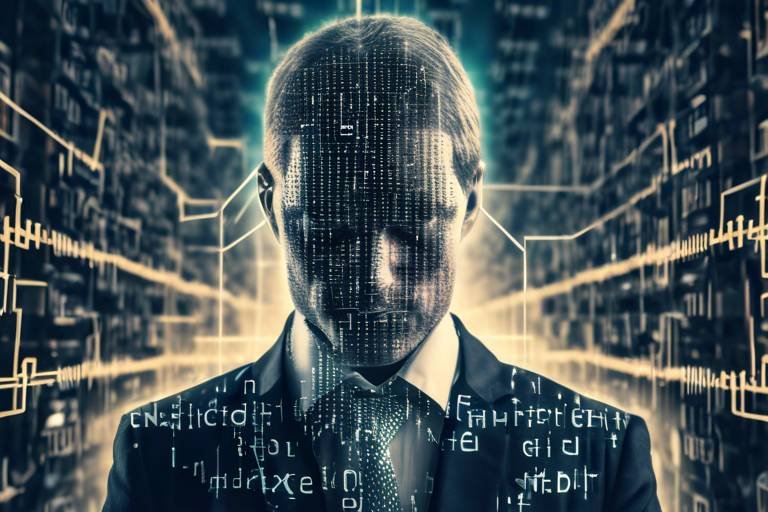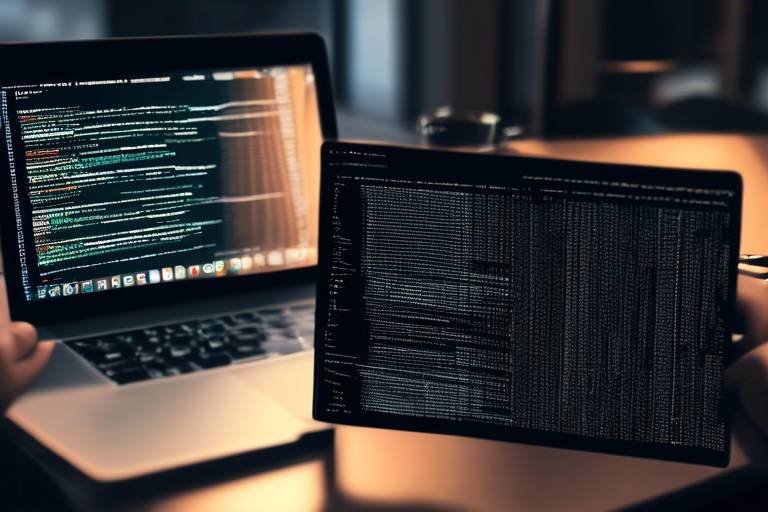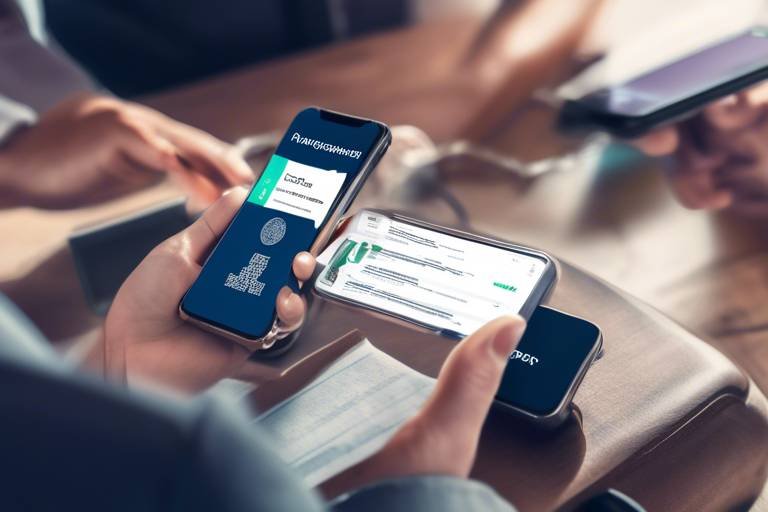How Blockchain is Transforming the Financial Audit Process
In today's fast-paced financial landscape, the need for transparency, accuracy, and efficiency has never been more critical. Enter blockchain technology, a revolutionary force that is reshaping the way financial audits are conducted. Imagine a world where every transaction is recorded in a secure, tamper-proof ledger, accessible in real-time by auditors and stakeholders alike. Sounds like something out of a sci-fi movie, right? But this is the reality we are rapidly approaching, and it’s transforming the financial audit process in ways we could only dream of a decade ago.
At its core, blockchain is a decentralized ledger technology that offers a high level of security and transparency. Unlike traditional systems where data can be manipulated or lost, blockchain ensures that once a transaction is recorded, it cannot be changed or deleted. This feature is particularly appealing in the world of finance, where the integrity of data is paramount. With blockchain, organizations can maintain a single source of truth, reducing discrepancies and fostering trust among stakeholders.
As we delve deeper into the impact of blockchain on financial audits, it’s essential to understand how this technology enhances the auditing process. One of the most significant advantages is the real-time data access it provides. Auditors can monitor transactions as they occur, rather than relying on historical data that may be outdated or inaccurate. This shift from retrospective to real-time auditing not only improves accuracy but also enhances compliance and accountability.
Moreover, the immutable nature of blockchain records significantly bolsters data integrity. Imagine a scenario where an auditor can confidently assert that the financial statements they are reviewing are free from fraud and errors, simply because the underlying data is tamper-proof. This not only reduces the risk of financial misreporting but also instills greater confidence in the financial statements being presented to stakeholders.
Another exciting aspect of blockchain technology is the potential for automation. With the advent of smart contracts—self-executing contracts with the terms of the agreement directly written into code—auditors can automate various tasks that were once manual and time-consuming. This streamlining of workflows can lead to significant savings in both time and resources, allowing auditors to focus on more strategic activities rather than getting bogged down in repetitive tasks.
However, despite the numerous benefits, the adoption of blockchain in auditing is not without its challenges. The regulatory landscape is still evolving, and auditors must navigate these regulations to ensure compliance while leveraging blockchain effectively. Additionally, there is a pressing need for technical expertise within the auditing profession. As blockchain technology continues to advance, auditors will need to equip themselves with the necessary skills to harness its full potential.
Looking ahead, the integration of blockchain into financial audits will undoubtedly shape the future of the auditing profession. Auditors will need to embrace ongoing skill development and training to stay relevant in this rapidly changing environment. The ability to analyze blockchain data, understand smart contracts, and navigate regulatory requirements will become essential skills for auditors.
In conclusion, the transformation brought about by blockchain technology in the financial audit process is profound. It offers a pathway to greater transparency, enhanced data integrity, and increased efficiency. As we continue to explore this exciting frontier, it’s clear that blockchain is not just a trend—it’s a fundamental shift in how we approach financial auditing.
- What is blockchain technology? Blockchain is a decentralized digital ledger that records transactions across many computers securely and transparently.
- How does blockchain improve the auditing process? It provides real-time access to data, enhances data integrity, and allows for automation of various tasks.
- What challenges does blockchain face in auditing? Regulatory concerns and the need for technical expertise are significant hurdles in adopting blockchain technology in auditing.
- What skills will auditors need in the future? Auditors will need to develop skills related to blockchain data analysis, smart contracts, and navigating evolving regulations.

Understanding Blockchain Technology
Blockchain technology is revolutionizing the way we think about transactions and data management. At its core, blockchain is a decentralized ledger that records transactions across multiple computers in such a way that the registered transactions cannot be altered retroactively. Imagine a digital notebook that everyone can see but no one can erase or change. This transparency ensures that all participants in a transaction have access to the same information, which significantly reduces the chances of fraud and manipulation.
The fundamental principles of blockchain technology can be boiled down to a few key concepts:
- Decentralization: Unlike traditional databases that are controlled by a central authority, blockchain operates on a peer-to-peer network. This means that no single entity has control over the entire chain, making it more resistant to failures and attacks.
- Immutability: Once a transaction is recorded on the blockchain, it becomes nearly impossible to alter. This characteristic is achieved through cryptographic hashing, which links each block of data to the previous one, creating a secure chain.
- Transparency: All participants can view the entire history of transactions, which fosters trust and accountability.
In the financial sector, these principles translate into a system where transactions are not only secure but also efficient. For instance, when a transaction occurs, it is instantly recorded on the blockchain, and all parties involved can access it in real-time. This immediacy can drastically reduce the time it takes to complete financial transactions, which is a significant advantage in today's fast-paced world.
Moreover, blockchain technology has the potential to streamline various processes in the financial industry, such as clearing and settlement, compliance checks, and record-keeping. By automating these processes through smart contracts—self-executing contracts with the terms of the agreement directly written into code—organizations can save both time and resources. Just think of it as having a personal assistant that never forgets a task and executes it flawlessly every time!
However, the journey to widespread adoption of blockchain technology is not without its challenges. Organizations must navigate a complex landscape of regulatory requirements and ensure that they have the necessary technical expertise to implement and maintain blockchain systems effectively. It's akin to learning a new language; while the benefits are clear, the learning curve can be steep.
In conclusion, understanding blockchain technology is crucial for anyone involved in the financial sector. Its potential to enhance transparency, security, and efficiency is undeniable. As we move forward, the question remains: how can organizations best leverage this transformative technology to improve their auditing processes and overall financial practices?
- What is blockchain technology? Blockchain is a decentralized ledger technology that records transactions across multiple computers, ensuring transparency and security.
- How does blockchain enhance auditing? By providing real-time access to immutable records, blockchain allows auditors to improve accuracy and efficiency.
- What are smart contracts? Smart contracts are self-executing contracts with the terms directly written into code, automating various tasks.
- What challenges does blockchain face in auditing? Challenges include regulatory concerns, the need for technical expertise, and the evolving nature of the technology.

The Role of Blockchain in Auditing
Blockchain technology is revolutionizing the way auditing is conducted, bringing about a paradigm shift that enhances accuracy and efficiency in the financial audit process. Imagine a world where auditors have access to real-time data, eliminating the tedious back-and-forth of traditional auditing methods. This is not just a dream; it's the reality that blockchain offers. By providing a decentralized and immutable ledger, blockchain ensures that all transactions are transparent and verifiable. This means auditors can trust the data they are reviewing without needing to rely heavily on third-party confirmations.
One of the most significant advantages of blockchain in auditing is its ability to provide real-time data access. Auditors can monitor transactions as they occur, which allows for a more dynamic approach to auditing. Instead of waiting for periodic reports, auditors can continuously assess the financial health of an organization. This real-time oversight not only enhances the accuracy of financial reporting but also helps in identifying discrepancies or anomalies immediately, reducing the risk of fraud and errors.
Moreover, the immutable nature of blockchain records means that once a transaction is recorded, it cannot be altered or deleted. This feature drastically improves data integrity. In traditional audits, data can sometimes be manipulated or lost, leading to inaccuracies in financial statements. However, with blockchain, auditors can confidently rely on the data presented, knowing that it is secure and tamper-proof. This shift not only enhances the credibility of financial reports but also builds trust among stakeholders.
In addition to improving data integrity and enabling real-time monitoring, blockchain can also automate various auditing tasks through the use of smart contracts. Smart contracts are self-executing contracts with the terms of the agreement directly written into code. They can automate processes such as compliance checks, transaction verification, and even report generation. This automation streamlines workflows, allowing auditors to focus on more complex analytical tasks rather than mundane data entry or verification processes. The result? Significant time and resource savings.
However, it’s essential to recognize that while blockchain presents remarkable opportunities for enhancing the auditing process, it also comes with its own set of challenges. Auditors must navigate the complexities of integrating this technology into their existing frameworks. Nonetheless, the potential benefits far outweigh the challenges, making it imperative for auditors to embrace this innovative technology.
In summary, blockchain is not just a passing trend; it is a transformative technology that is reshaping the auditing landscape. By enhancing data integrity, enabling real-time auditing, and automating processes, blockchain is set to redefine the role of auditors, making them more efficient and effective in their duties.
- What is blockchain? Blockchain is a decentralized digital ledger that records transactions across multiple computers securely and transparently.
- How does blockchain improve auditing? By providing real-time data access and immutable records, blockchain enhances the accuracy and efficiency of the auditing process.
- What are smart contracts? Smart contracts are automated contracts that execute predefined actions when specific conditions are met, streamlining various audit tasks.
- What challenges does blockchain face in auditing? Challenges include regulatory concerns, the need for technical expertise, and integration with existing auditing practices.

Improving Data Integrity
In the realm of financial auditing, data integrity is paramount. The introduction of blockchain technology has revolutionized this aspect by providing an unprecedented level of security and reliability. Imagine a digital fortress where each transaction is recorded in a way that is not only transparent but also immutable. This means that once data is entered into the blockchain, it cannot be altered or deleted without leaving a trace. Such a feature is a game-changer for auditors who are often tasked with verifying the accuracy of financial records.
One of the most significant benefits of blockchain is its tamper-proof nature. Traditional auditing methods often face challenges due to human error, fraud, or even unintentional data manipulation. With blockchain, the risks associated with these issues are drastically reduced. Each transaction is validated by a network of computers, ensuring that only accurate and verified information is recorded. This collective validation process is akin to having multiple witnesses to a transaction, significantly enhancing trust in the data.
Furthermore, the transparency offered by blockchain allows auditors to trace the entire history of a transaction. They can easily access previous records, making it simpler to identify discrepancies or anomalies. This capability not only improves the accuracy of financial reporting but also fosters a culture of accountability within organizations. When employees know that their actions are being recorded in a transparent manner, they are more likely to adhere to ethical practices.
To illustrate the impact of blockchain on data integrity, consider the following table:
| Traditional Method | Blockchain Method |
|---|---|
| Data can be altered or deleted | Data is immutable once recorded |
| Single point of failure | Decentralized validation by multiple nodes |
| Higher risk of fraud | Reduced fraud risk due to transparency |
| Time-consuming audits | Real-time access to data |
In summary, the integration of blockchain technology into the financial audit process significantly enhances data integrity. As auditors begin to leverage this powerful tool, we can expect a notable shift towards more reliable, transparent, and efficient auditing practices. The future of auditing is not just about crunching numbers; it's about ensuring that the numbers are trustworthy from the start.
- What is blockchain technology?
Blockchain is a decentralized digital ledger that records transactions across many computers, ensuring that the recorded transactions cannot be altered retroactively. - How does blockchain improve data integrity?
Blockchain enhances data integrity by providing an immutable record of transactions, reducing the risk of fraud and errors. - Can auditors rely solely on blockchain for auditing?
While blockchain significantly improves the auditing process, auditors should still apply their expertise and judgment to ensure comprehensive evaluations. - What are the challenges of implementing blockchain in auditing?
Challenges include regulatory concerns, the need for technical expertise, and the integration of blockchain systems with existing auditing processes.

Real-Time Auditing
Imagine a world where auditors no longer have to wait for the end of the month or quarter to gather data and perform their analysis. With blockchain technology, this dream is becoming a reality through the concept of . This innovative approach allows auditors to continuously monitor transactions as they occur, providing a level of oversight that traditional methods simply can't match. By harnessing the power of blockchain, auditors can access up-to-the-minute data, enabling them to identify discrepancies and anomalies almost instantaneously.
Real-time auditing transforms the way organizations maintain compliance and accountability. Instead of relying on retrospective audits that may miss critical issues, auditors can engage in a proactive approach. This means that potential problems can be flagged and addressed as they arise, significantly reducing the risk of financial misstatements. For instance, if a transaction appears unusual or deviates from established patterns, auditors can investigate immediately, rather than waiting weeks or months to uncover the issue during a scheduled audit.
Moreover, the transparency offered by blockchain ensures that all transactions are recorded in an immutable ledger. This tamper-proof nature not only enhances trust among stakeholders but also serves as a robust defense against fraud. With all parties having access to the same real-time data, discrepancies can be quickly identified and resolved. This leads to a more collaborative environment where auditors, management, and stakeholders can work together to uphold the integrity of financial reporting.
To illustrate the benefits of real-time auditing, consider the following table that outlines key advantages:
| Advantage | Description |
|---|---|
| Proactive Issue Resolution | Auditors can identify and address discrepancies as they occur, rather than after the fact. |
| Enhanced Transparency | All transactions are recorded on a public ledger, fostering trust among stakeholders. |
| Improved Efficiency | Real-time access to data streamlines the audit process, saving time and resources. |
| Fraud Mitigation | Tamper-proof records reduce the risk of financial fraud and errors. |
In a rapidly evolving financial landscape, adopting real-time auditing powered by blockchain is not just an option; it's becoming a necessity. Organizations that embrace this technology will not only stay ahead of regulatory requirements but also enhance their operational efficiency and strengthen their financial integrity. As we look to the future, the ability to conduct audits in real-time will undoubtedly set a new standard in the industry, transforming the role of auditors from mere evaluators to proactive guardians of financial health.

Automated Processes
In the world of auditing, time is money, and every second counts. Imagine a scenario where mundane, repetitive tasks are handled without human intervention, allowing auditors to focus on what truly matters—analyzing data and providing insights. This is where through blockchain technology come into play. By leveraging the power of smart contracts, auditors can streamline various auditing tasks, transforming the traditional audit landscape.
Smart contracts are essentially self-executing contracts with the terms of the agreement directly written into lines of code. They automatically enforce and execute contractual obligations when predetermined conditions are met. This means that once a transaction is recorded on the blockchain, the smart contract can trigger actions such as notifications, compliance checks, or even payment settlements without needing manual oversight. This not only enhances efficiency but also minimizes the risk of human error.
To illustrate the impact of automated processes in auditing, consider the following benefits:
- Increased Efficiency: Automation reduces the time spent on routine tasks, allowing auditors to reallocate their efforts toward more strategic activities.
- Cost Savings: By cutting down on manual labor, organizations can save on labor costs and allocate resources more effectively.
- Enhanced Accuracy: Automated processes are less prone to errors, ensuring that the data used in audits is reliable and trustworthy.
- Real-Time Monitoring: Smart contracts can provide continuous oversight, alerting auditors to any discrepancies or compliance issues as they arise.
Moreover, the integration of automation into the audit process allows for a more dynamic approach to risk management. Auditors can set parameters within smart contracts to flag unusual transactions or anomalies, enhancing their ability to detect fraud or misreporting early in the process. This proactive approach can significantly bolster the integrity of financial reporting, providing stakeholders with greater confidence in the accuracy of the information presented.
However, it’s essential to recognize that while automation offers substantial benefits, it also requires a shift in mindset and skill sets among auditors. Professionals in the field must embrace technology and develop a keen understanding of how to utilize these automated tools effectively. Training and education will play a pivotal role in this transition, ensuring that auditors are equipped to harness the full potential of blockchain technology.
As we look to the future, the automation of auditing processes through blockchain is not just a trend; it’s a fundamental transformation that promises to redefine the profession. By embracing these advancements, auditors can enhance their value proposition, providing deeper insights and more reliable audits than ever before.
Q1: What are smart contracts?
A1: Smart contracts are self-executing contracts with the terms of the agreement directly written into code, allowing for automated execution and enforcement.
Q2: How does automation improve auditing?
A2: Automation improves auditing by increasing efficiency, reducing costs, enhancing accuracy, and enabling real-time monitoring of transactions.
Q3: What skills do auditors need to adapt to blockchain technology?
A3: Auditors need to develop skills in technology, data analysis, and an understanding of blockchain mechanics to effectively leverage automated processes in auditing.

Challenges of Implementing Blockchain in Auditing
While the allure of blockchain technology in the auditing sphere is undeniable, it doesn't come without its fair share of challenges. First and foremost, one of the significant hurdles is the regulatory landscape. The financial sector is heavily regulated, and the integration of blockchain must align with existing laws and regulations. This can be quite the juggling act, as auditors need to ensure compliance while also trying to leverage the innovative aspects of blockchain.
Moreover, the technical expertise required to implement and maintain blockchain systems poses another challenge. Many auditors may not have the necessary background in technology or data science to fully grasp how blockchain works. This gap in knowledge can lead to misunderstandings or mismanagement of blockchain systems, which could ultimately compromise the integrity of the audit process.
Additionally, there's the issue of interoperability. The financial world is a complex web of different systems and platforms, and ensuring that blockchain can seamlessly integrate with existing technologies is crucial. If blockchain solutions cannot communicate effectively with other systems, the potential benefits of enhanced transparency and efficiency may be lost. This challenge necessitates collaboration among tech developers, auditors, and financial institutions to create solutions that work harmoniously together.
Furthermore, the perception of blockchain as a disruptive technology can create resistance among traditional auditors and organizations. Many professionals in the field may be hesitant to embrace a new way of doing things, particularly if they feel that their expertise is being undermined. Overcoming this resistance requires a cultural shift within organizations, emphasizing the importance of innovation and adaptability in an ever-evolving financial landscape.
Lastly, cost implications cannot be overlooked. Implementing blockchain technology often requires significant investment in both time and resources. For smaller firms or organizations with tight budgets, the upfront costs associated with transitioning to a blockchain-based auditing system might seem daunting. However, it's essential to weigh these costs against the long-term benefits that blockchain can bring, such as improved efficiency and reduced fraud.
In summary, while the integration of blockchain into auditing presents exciting opportunities, it also comes with challenges that must be addressed. From regulatory compliance and technical expertise to interoperability and cost implications, auditors must navigate a complex landscape as they work to harness the power of blockchain technology.
- What is blockchain technology? Blockchain is a decentralized ledger system that ensures transparency and security in transactions, making it highly relevant for financial auditing.
- How does blockchain improve the auditing process? Blockchain offers real-time data access, immutable records, and the potential for automated processes, enhancing accuracy and efficiency in audits.
- What are the main challenges of implementing blockchain in auditing? Key challenges include regulatory compliance, the need for technical expertise, interoperability with existing systems, resistance to change, and cost implications.
- What skills do auditors need to adapt to blockchain technology? Auditors will need to develop skills in technology, data analysis, and an understanding of blockchain systems to effectively leverage this technology in their work.

Future Implications for Auditors
The integration of blockchain technology into financial audits is not just a passing trend; it is a profound shift that will redefine the auditing landscape for years to come. As auditors increasingly adopt this innovative technology, they will find themselves at the forefront of a revolution that enhances transparency, efficiency, and accuracy in financial reporting. Imagine a world where financial statements are not only prepared but also verified in real-time, reducing the lag time between reporting and auditing. This is the future that blockchain promises.
One of the most significant implications of blockchain for auditors is the evolution of their roles. Traditionally, auditors have been seen as gatekeepers of financial integrity, but with blockchain, they will become more like navigators, guiding organizations through the complexities of a decentralized financial ecosystem. They will need to embrace a proactive approach, continuously monitoring transactions rather than simply conducting periodic reviews. This shift towards real-time auditing will require auditors to develop new skills and adapt their methodologies, ensuring they remain relevant in this fast-paced environment.
Moreover, the demand for skill development and training will intensify. Auditors will need to familiarize themselves with blockchain technology, understanding its intricacies and potential pitfalls. This means not only grasping the technical aspects but also being able to interpret the data generated by blockchain systems. As a result, educational institutions and professional organizations will play a crucial role in providing the necessary training and resources for auditors to thrive in this new landscape. The ability to analyze and leverage blockchain data will become a highly sought-after skill, separating the leaders from the followers in the auditing profession.
However, the road to blockchain integration is not without its challenges. The regulatory landscape surrounding blockchain is still evolving, and auditors must navigate these complexities to ensure compliance while leveraging the technology for audits. Regulatory bodies are beginning to recognize the potential of blockchain, but they are also cautious about its implications. Auditors will need to stay abreast of these changes, adapting their practices to meet new standards and requirements. This dynamic environment will require a keen understanding of both technology and regulation, making the role of the auditor more multifaceted than ever before.
In summary, the future of auditing in a blockchain-driven world holds immense potential but also significant challenges. Auditors must evolve alongside technology, embracing continuous learning and adaptation. The ability to harness the power of blockchain will not only enhance their effectiveness but also redefine their role within organizations. As we move forward, the collaboration between auditors, technology developers, and regulatory bodies will be essential in shaping a secure and efficient financial audit process.
- What is blockchain technology? Blockchain is a decentralized ledger technology that records transactions across many computers in a way that the registered transactions cannot be altered retroactively.
- How does blockchain improve auditing? Blockchain enhances auditing by providing real-time access to immutable records, which increases data integrity and reduces the risk of fraud.
- What skills will auditors need in the future? Auditors will need to develop skills in blockchain technology, data analysis, and regulatory compliance to navigate the new auditing landscape effectively.
- Are there regulatory challenges with blockchain? Yes, the regulatory landscape for blockchain is still evolving, and auditors will need to stay informed about new regulations to ensure compliance.

Skill Development and Training
As the world of finance continues to evolve with the integration of blockchain technology, it is essential for auditors to embrace a mindset of continuous learning and adaptation. The rapid pace of technological advancements means that traditional audit skills may no longer suffice. Auditors must now equip themselves with a new set of competencies that include not only a deep understanding of blockchain but also the ability to leverage data analytics and cybersecurity measures. Imagine a chef who has mastered the art of cooking but struggles to use modern kitchen gadgets; the same applies to auditors who are well-versed in traditional methods yet lack the technical savvy needed to navigate the blockchain landscape.
To stay relevant, auditors should focus on the following key areas of skill development:
- Understanding Blockchain Fundamentals: Auditors need to grasp how blockchain works, including concepts like decentralization, consensus mechanisms, and smart contracts. This foundational knowledge will empower them to assess blockchain systems effectively.
- Data Analytics: With blockchain, the volume of data available for analysis is immense. Auditors should be proficient in data analytics tools and techniques to extract meaningful insights from this data.
- Cybersecurity Awareness: As blockchain introduces new security paradigms, auditors must be aware of potential vulnerabilities and how to mitigate risks associated with digital assets.
Training programs and workshops focused on these areas can be invaluable. Organizations should consider investing in comprehensive training initiatives that not only cover the technical aspects of blockchain but also emphasize practical applications in auditing. For instance, simulations and case studies can provide auditors with hands-on experience in tackling real-world scenarios involving blockchain.
Moreover, the collaboration between educational institutions and auditing firms can pave the way for tailored courses that address the specific needs of the industry. By fostering partnerships, both parties can ensure that upcoming auditors are well-prepared to meet the challenges posed by blockchain technology. This proactive approach to skill development will not only enhance individual capabilities but also strengthen the overall integrity of the auditing profession.
In conclusion, as blockchain continues to reshape the financial landscape, the onus is on auditors to evolve alongside it. By prioritizing skill development and training, they can position themselves as invaluable assets in an increasingly complex and technology-driven environment.
- What skills do auditors need to develop for blockchain? Auditors should focus on understanding blockchain fundamentals, data analytics, and cybersecurity awareness.
- How can organizations support auditors in skill development? Organizations can invest in training programs, workshops, and partnerships with educational institutions.
- Is blockchain knowledge essential for all auditors? While not mandatory, having blockchain knowledge is increasingly becoming a crucial asset for auditors in the evolving financial landscape.

Regulatory Considerations
As blockchain technology continues to weave its way into the fabric of financial auditing, one cannot overlook the that come into play. The landscape of regulations is still evolving, and this presents both challenges and opportunities for auditors. While blockchain promises increased transparency and efficiency, it also raises questions about compliance and governance that auditors must navigate carefully.
One of the primary concerns is the lack of standardized regulations governing blockchain technology. Different jurisdictions are adopting varying approaches, which can create a complex web of compliance requirements for organizations operating across borders. For instance, while some countries are embracing blockchain with open arms, others are still hesitant, imposing stringent regulations that could stifle innovation. This inconsistency can lead to confusion among auditors who are tasked with ensuring that their organizations adhere to applicable laws.
Moreover, auditors must also be aware of the data privacy regulations that intertwine with blockchain technology. Given that blockchain is inherently transparent, the challenge lies in maintaining the confidentiality of sensitive financial information. Regulations such as the General Data Protection Regulation (GDPR) in Europe impose strict guidelines on how personal data is handled, which can clash with the immutable nature of blockchain. Auditors will need to understand how to balance these competing interests to ensure compliance without compromising the benefits of blockchain.
In addition to data privacy, there are also anti-money laundering (AML) and know your customer (KYC) regulations that auditors must consider. Blockchain’s decentralized nature can complicate the implementation of these regulations, as transactions can occur without the need for intermediaries. This raises the question: how can auditors verify the legitimacy of transactions on a blockchain? Addressing these regulatory challenges requires a robust understanding of both blockchain technology and the legal frameworks that govern financial transactions.
To navigate this complex regulatory landscape, auditors will need to invest in training and education focused on blockchain and its implications for compliance. Staying informed about the latest regulatory developments will be crucial for auditors to provide value to their organizations. This may involve attending workshops, participating in industry forums, and collaborating with legal experts to ensure that they are equipped to handle the unique challenges posed by blockchain technology.
In conclusion, while blockchain offers promising enhancements to the auditing process, it is essential for auditors to remain vigilant regarding regulatory considerations. By understanding the regulatory environment and actively seeking to comply with evolving standards, auditors can effectively leverage blockchain technology to improve their practices while safeguarding their organizations against potential legal pitfalls.
- What is the biggest regulatory challenge for auditors using blockchain?
The biggest challenge is navigating the lack of standardized regulations across different jurisdictions, which can create confusion and compliance issues. - How does blockchain affect data privacy regulations?
Blockchain's transparency can conflict with data privacy laws like GDPR, requiring auditors to find a balance between compliance and the benefits of blockchain. - What skills do auditors need to adapt to blockchain technology?
Auditors will need to develop skills in technology, data analysis, and regulatory knowledge to effectively work with blockchain in auditing.
Frequently Asked Questions
- What is blockchain technology?
Blockchain technology is a decentralized digital ledger that records transactions across many computers. This means that the recorded data cannot be altered retroactively without the alteration of all subsequent blocks and the consensus of the network. It ensures transparency and security, making it particularly useful in sectors like finance.
- How does blockchain improve the auditing process?
Blockchain enhances the auditing process by providing real-time data access and immutable records. Auditors can leverage this technology to improve accuracy and efficiency, as it allows for continuous monitoring of transactions, reducing the chances of errors and fraud.
- What are the benefits of real-time auditing with blockchain?
Real-time auditing with blockchain enables auditors to continuously monitor transactions, which helps in maintaining compliance and accountability. This immediate oversight allows for quicker identification of discrepancies, leading to timely corrections and increased trust in financial reporting.
- Can blockchain automate auditing tasks?
Yes, blockchain can automate various auditing tasks through smart contracts. These automated processes streamline workflows, saving time and resources by reducing the need for manual interventions in routine auditing activities.
- What challenges do auditors face when implementing blockchain?
Despite its advantages, auditors face challenges such as regulatory concerns, the need for technical expertise, and potential resistance to change within organizations. Navigating these hurdles is crucial for successful blockchain adoption in auditing.
- How will blockchain shape the future of auditing?
The integration of blockchain into financial audits will significantly impact the profession by requiring auditors to develop new skills and adapt to technological changes. As blockchain continues to evolve, auditors will need to stay updated on regulatory considerations and technological advancements to remain effective.
- What skills will auditors need to develop for blockchain?
Auditors will need to develop technical skills related to blockchain technology, data analysis, and cybersecurity. Training and education will be essential for auditors to navigate the complexities of blockchain and leverage its benefits in their auditing practices.
- Are there regulatory considerations for blockchain in auditing?
Yes, the regulatory landscape surrounding blockchain is still evolving. Auditors must stay informed about regulations and ensure compliance while utilizing blockchain technology for audits. This requires a proactive approach to understanding and adapting to new legal frameworks.



















